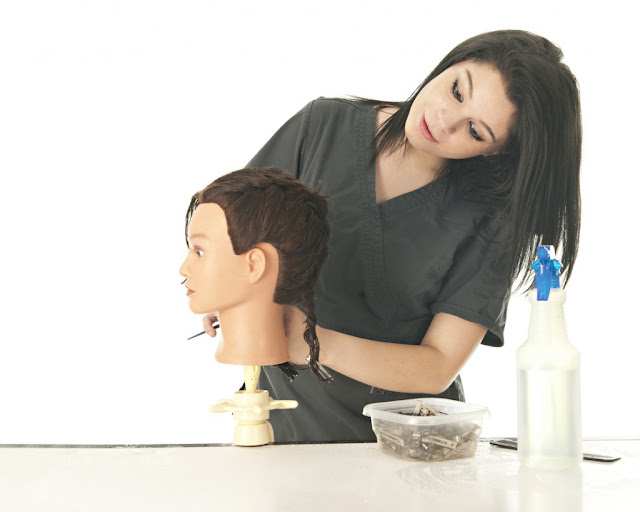How Do You Learn in Cosmetology School?
"The art of styling hair, doing make up and the other lessons cosmetology school teaches you deals entirely with skill. You do not sit at a desk and do research; you work with your hands and provide clients with what they ask for based on what you learned. Thus, beauty school offers hands-on training.
Different states require different hours in order to meet the graduation criteria. During the hours you are required to attend your selected beauty academy, you will gain the knowledge you need to go into the field of your dreams. In order to do so, you have to learn the basics and beyond. This is done in two ways: first, your beauty school program's teacher will provide you with knowledge in the cognitive sense. It requires bookwork and lectures in order to learn the tips of the trade. However, attendants also receive training that people in other colleges and universities don't receive: hands-on training.
When you go into a salon and ask for a French manicure, the nail technician does not begin working on your nails solely based on what they learned from lectures and books. If that was the case, the technician would be unsteady and inexperienced. You probably wouldn't trust them near your nails if you knew they left their beauty school with knowledge but no training. This is why they provide hands-on training in a relaxed setting. Part of your school training requires you to work in student salons (with supervision by instructors) on real people.
If you're thinking about attending beauty school, it's important to know the depth of the work you will be doing there. If the idea of lecture halls bores you, beauty academy has your way out. However, if you think your first day will be spent waxing a friend's eyebrows, you'd be wrong. Beauty school provides a mixture of learning techniques that range from bookwork to hands-on training, and that's what makes the experience both unique and beneficial."
"The art of styling hair, doing make up and the other lessons cosmetology school teaches you deals entirely with skill. You do not sit at a desk and do research; you work with your hands and provide clients with what they ask for based on what you learned. Thus, beauty school offers hands-on training.
Different states require different hours in order to meet the graduation criteria. During the hours you are required to attend your selected beauty academy, you will gain the knowledge you need to go into the field of your dreams. In order to do so, you have to learn the basics and beyond. This is done in two ways: first, your beauty school program's teacher will provide you with knowledge in the cognitive sense. It requires bookwork and lectures in order to learn the tips of the trade. However, attendants also receive training that people in other colleges and universities don't receive: hands-on training.
When you go into a salon and ask for a French manicure, the nail technician does not begin working on your nails solely based on what they learned from lectures and books. If that was the case, the technician would be unsteady and inexperienced. You probably wouldn't trust them near your nails if you knew they left their beauty school with knowledge but no training. This is why they provide hands-on training in a relaxed setting. Part of your school training requires you to work in student salons (with supervision by instructors) on real people.
If you're thinking about attending beauty school, it's important to know the depth of the work you will be doing there. If the idea of lecture halls bores you, beauty academy has your way out. However, if you think your first day will be spent waxing a friend's eyebrows, you'd be wrong. Beauty school provides a mixture of learning techniques that range from bookwork to hands-on training, and that's what makes the experience both unique and beneficial."

Comments
Post a Comment